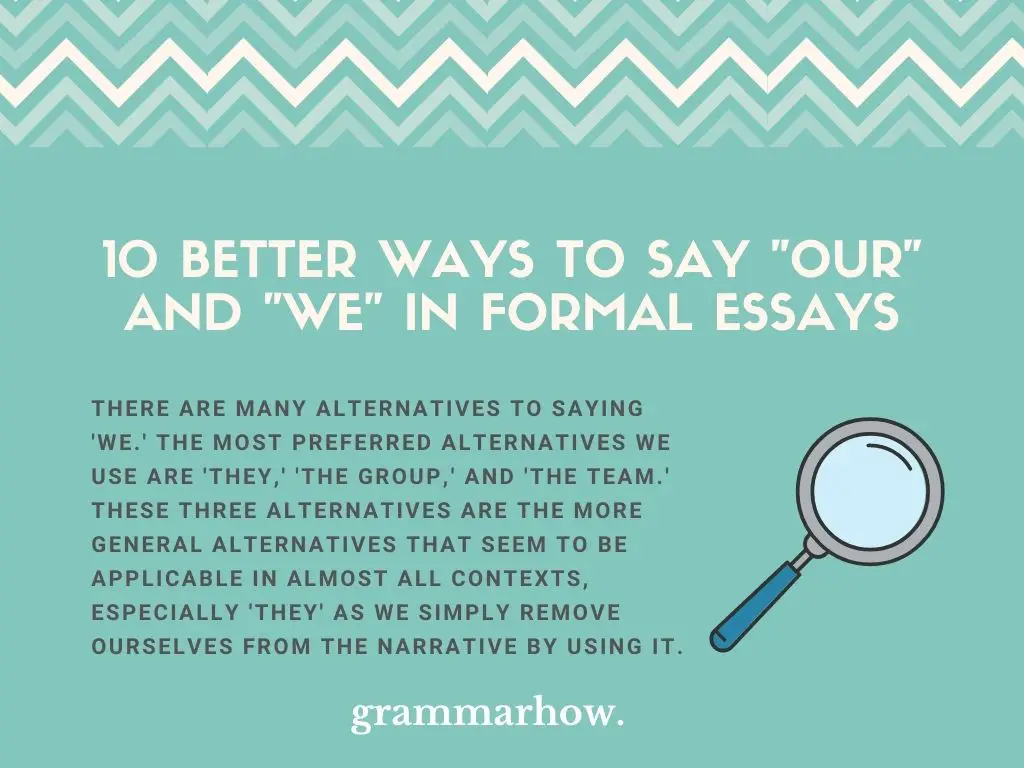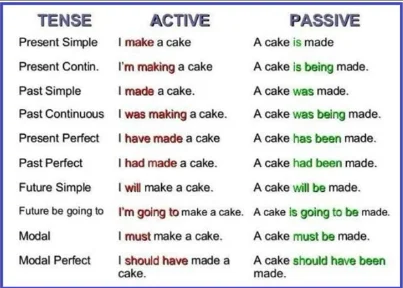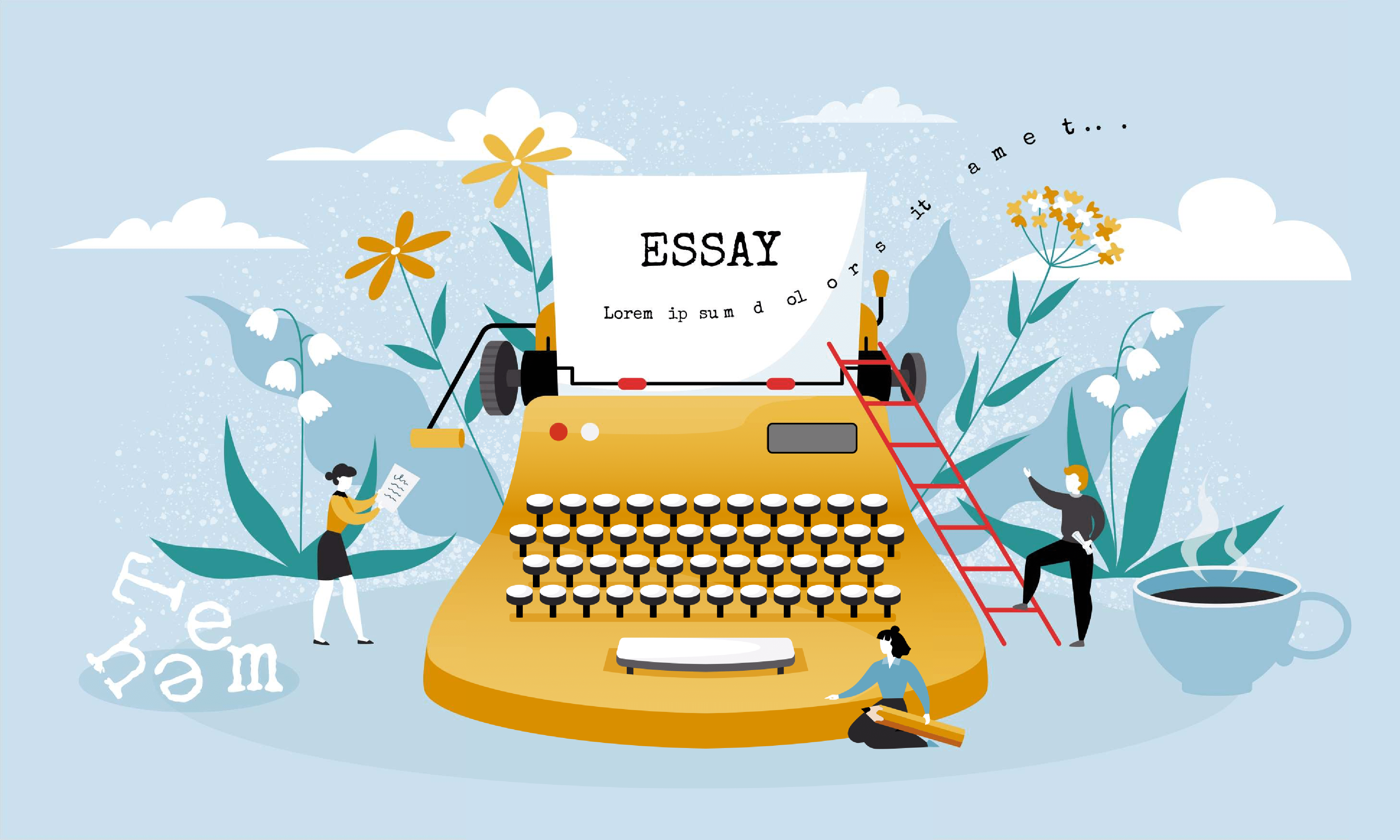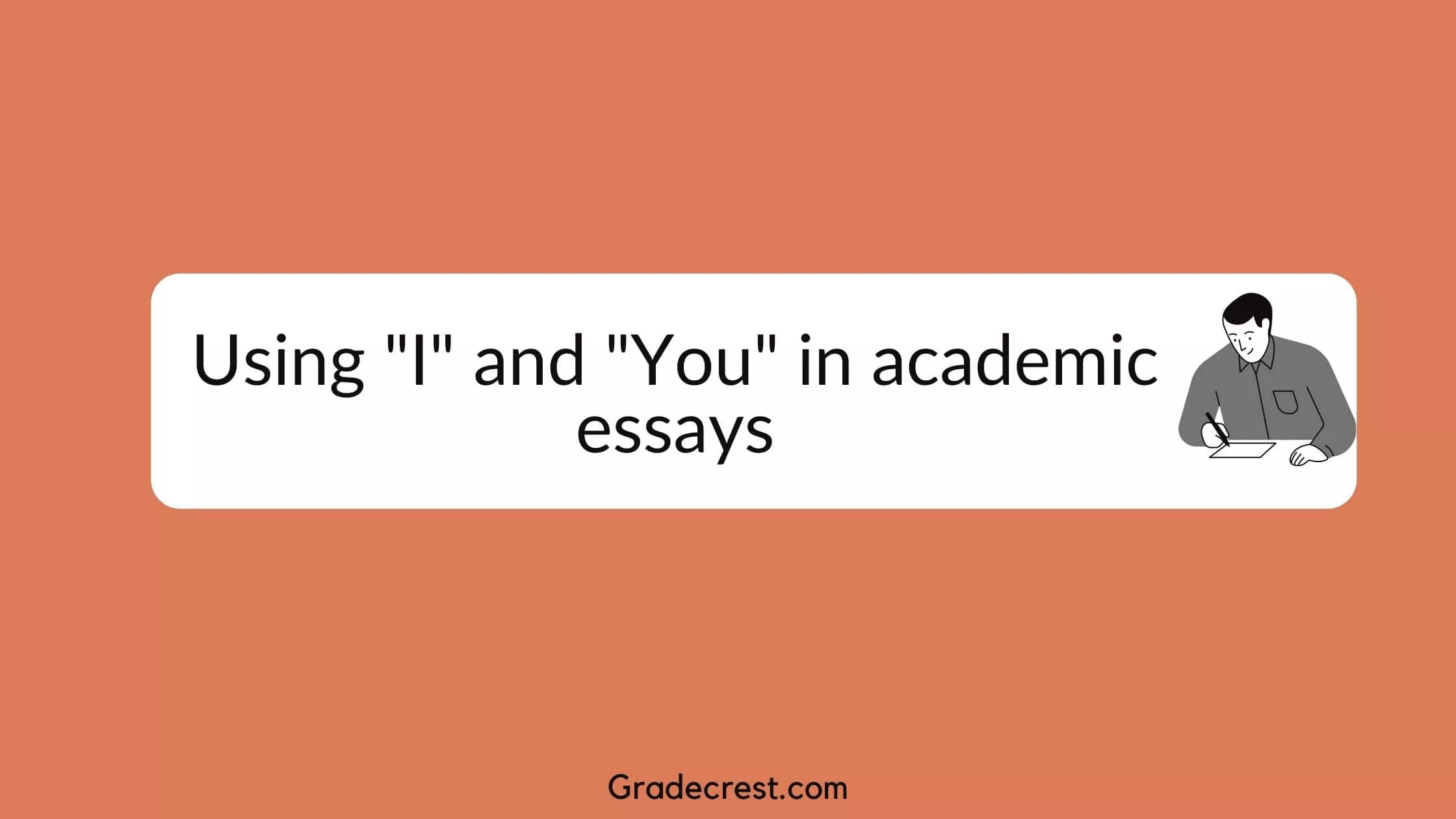
- Tips & Guides

How To Avoid Using “We,” “You,” And “I” in an Essay
- Posted on October 27, 2022 October 27, 2022
Maintaining a formal voice while writing academic essays and papers is essential to sound objective.
One of the main rules of academic or formal writing is to avoid first-person pronouns like “we,” “you,” and “I.” These words pull focus away from the topic and shift it to the speaker – the opposite of your goal.
While it may seem difficult at first, some tricks can help you avoid personal language and keep a professional tone.
Let’s learn how to avoid using “we” in an essay.
What Is a Personal Pronoun?
Pronouns are words used to refer to a noun indirectly. Examples include “he,” “his,” “her,” and “hers.” Any time you refer to a noun – whether a person, object, or animal – without using its name, you use a pronoun.
Personal pronouns are a type of pronoun. A personal pronoun is a pronoun you use whenever you directly refer to the subject of the sentence.
Take the following short paragraph as an example:
“Mr. Smith told the class yesterday to work on our essays. Mr. Smith also said that Mr. Smith lost Mr. Smith’s laptop in the lunchroom.”
The above sentence contains no pronouns at all. There are three places where you would insert a pronoun, but only two where you would put a personal pronoun. See the revised sentence below:
“Mr. Smith told the class yesterday to work on our essays. He also said that he lost his laptop in the lunchroom.”
“He” is a personal pronoun because we are talking directly about Mr. Smith. “His” is not a personal pronoun (it’s a possessive pronoun) because we are not speaking directly about Mr. Smith. Rather, we are talking about Mr. Smith’s laptop.
If later on you talk about Mr. Smith’s laptop, you may say:
“Mr. Smith found it in his car, not the lunchroom!”
In this case, “it” is a personal pronoun because in this point of view we are making a reference to the laptop directly and not as something owned by Mr. Smith.
Why Avoid Personal Pronouns in Essay Writing
We’re teaching you how to avoid using “I” in writing, but why is this necessary? Academic writing aims to focus on a clear topic, sound objective, and paint the writer as a source of authority. Word choice can significantly impact your success in achieving these goals.
Writing that uses personal pronouns can unintentionally shift the reader’s focus onto the writer, pulling their focus away from the topic at hand.
Personal pronouns may also make your work seem less objective.
One of the most challenging parts of essay writing is learning which words to avoid and how to avoid them. Fortunately, following a few simple tricks, you can master the English Language and write like a pro in no time.
Alternatives To Using Personal Pronouns
How to not use “I” in a paper? What are the alternatives? There are many ways to avoid the use of personal pronouns in academic writing. By shifting your word choice and sentence structure, you can keep the overall meaning of your sentences while re-shaping your tone.
Utilize Passive Voice
In conventional writing, students are taught to avoid the passive voice as much as possible, but it can be an excellent way to avoid first-person pronouns in academic writing.
You can use the passive voice to avoid using pronouns. Take this sentence, for example:
“ We used 150 ml of HCl for the experiment.”
Instead of using “we” and the active voice, you can use a passive voice without a pronoun. The sentence above becomes:
“150 ml of HCl were used for the experiment.”
Using the passive voice removes your team from the experiment and makes your work sound more objective.
Take a Third-Person Perspective
Another answer to “how to avoid using ‘we’ in an essay?” is the use of a third-person perspective. Changing the perspective is a good way to take first-person pronouns out of a sentence. A third-person point of view will not use any first-person pronouns because the information is not given from the speaker’s perspective.
A third-person sentence is spoken entirely about the subject where the speaker is outside of the sentence.
Take a look at the sentence below:
“In this article you will learn about formal writing.”
The perspective in that sentence is second person, and it uses the personal pronoun “you.” You can change this sentence to sound more objective by using third-person pronouns:
“In this article the reader will learn about formal writing.”
The use of a third-person point of view makes the second sentence sound more academic and confident. Second-person pronouns, like those used in the first sentence, sound less formal and objective.
Be Specific With Word Choice
You can avoid first-personal pronouns by choosing your words carefully. Often, you may find that you are inserting unnecessary nouns into your work.
Take the following sentence as an example:
“ My research shows the students did poorly on the test.”
In this case, the first-person pronoun ‘my’ can be entirely cut out from the sentence. It then becomes:
“Research shows the students did poorly on the test.”
The second sentence is more succinct and sounds more authoritative without changing the sentence structure.
You should also make sure to watch out for the improper use of adverbs and nouns. Being careful with your word choice regarding nouns, adverbs, verbs, and adjectives can help mitigate your use of personal pronouns.
“They bravely started the French revolution in 1789.”
While this sentence might be fine in a story about the revolution, an essay or academic piece should only focus on the facts. The world ‘bravely’ is a good indicator that you are inserting unnecessary personal pronouns into your work.
We can revise this sentence into:
“The French revolution started in 1789.”
Avoid adverbs (adjectives that describe verbs), and you will find that you avoid personal pronouns by default.
Closing Thoughts
In academic writing, It is crucial to sound objective and focus on the topic. Using personal pronouns pulls the focus away from the subject and makes writing sound subjective.
Hopefully, this article has helped you learn how to avoid using “we” in an essay.
When working on any formal writing assignment, avoid personal pronouns and informal language as much as possible.
While getting the hang of academic writing, you will likely make some mistakes, so revising is vital. Always double-check for personal pronouns, plagiarism , spelling mistakes, and correctly cited pieces.
You can prevent and correct mistakes using a plagiarism checker at any time, completely for free.
Quetext is a platform that helps you with all those tasks. Check out all resources that are available to you today.
Sign Up for Quetext Today!
Click below to find a pricing plan that fits your needs.
You May Also Like

Why Is Plagiarism Bad? And How To Avoid It
- Posted on December 12, 2024

How to paraphrase content: Step-by-step guide
- Posted on December 6, 2024 December 6, 2024

The Most Important Phrases To Avoid in an Essay
- Posted on November 4, 2024 November 21, 2024

Writing Under Pressure: Strategies for Excelling in Timed Essay Exams
- Posted on October 24, 2024

Writing with Confidence: Strategies for Overcoming Self-Doubt and Imposter Syndrome
- Posted on October 18, 2024 November 1, 2024

Best AI Detector Tools for Content, Images & Videos
- Posted on October 9, 2024 November 21, 2024

7 Best AI Detectors for Teachers & Professors (+ How To Choose)
- Posted on September 25, 2024 November 21, 2024

How Professors Check for Plagiarism (+Tips for Plagiarism Prevention)
- Posted on September 18, 2024 October 9, 2024
Input your search keywords and press Enter.

10 Better Ways To Say “Our” And “We” In Formal Essays
When writing formal essays, there are rules of English grammar that we need to follow. Sometimes, we need to change perspective, and instead of writing in the first person and saying ‘we,’ we need to stay in the third person. So, what are the best alternatives to saying ‘we?’

There are many alternatives to saying ‘we.’ The most preferred alternatives we use are ‘they,’ ‘the group,’ and ‘the team.’ These three alternatives are the more general alternatives that seem to be applicable in almost all contexts, especially ‘they’ as we simply remove ourselves from the narrative by using it.
‘They’ is the most general and preferred alternative to ‘we’ and ‘us.’ By using ‘they,’ we replace our first-person pronoun with a third-person pronoun that simply excludes ourselves from the narrative, making the essay sound more objective and formal. ‘They’ is also a pronoun that is applicable in all contexts.
Take a look at these examples below.
- Original: Humans are incredible creatures. We have so much creativity.
- Alternative: Humans are incredible creatures. They have so much creativity.
- Original: Our group will report tomorrow. We will talk about this month’s sales.
- Alternative: Their group will report tomorrow. They will talk about this month’s sales.
- Original: We simply hope the audience learned something from us.
- Alternative: They simply hope the audience learned something from them.
- Original: We’ve done our research, but we don’t have precise predictions yet.
- Alternative: They’ve done their research, but they don’t have precise predictions yet.
‘The group’ is a good, general alternative to saying ‘we’ in formal essays. However, this alternative specifies that we refer to ‘we’ as a group of individuals. Therefore, this alternative does not apply to populations of large scale like nations, humans, or races.
- Original: We were able to conclude the following findings.
- Alternative: The group was able to conclude the following findings.
- Original: We could not administer the test today due to certain circumstances.
- Alternative: The group could not administer the test today due to certain circumstances?
- Original: Our experimental set-ups did not yield any significant difference.
- Alternative: The group’s experimental set-ups did not yield any significant difference.
- Original: It is beneficial for us if more people participate in the study.
- Alternative: It is beneficial for the group if more people participate in the study.
‘The team’ is synonymous with ‘the group.’ It is another alternative to saying ‘we’ but implies that ‘we’ refers to a team or a group of individuals that are together for the same purpose. However, ‘the team’ does not apply to bigger populations, like an entire race or human population.
- Original: We are composed of individuals with a passion for learning.
- Alternative: The team is composed of individuals with a passion for learning.
- Original: The results of our work do not define our identity.
- Alternative: The results of the team’s work do not define the team’s identity.
- Original: We poured our best efforts into this project.
- Alternative: The team poured their best efforts into this project.
- Original: We do not tolerate any misconduct and violent behavior.
- Alternative: The team does not tolerate any misconduct and violent behavior.
‘The body’ is another alternative for saying ‘we’ in formal essays. We mostly use ‘body’ when referring to large groups of individuals like the audience, spectators, or students. However, we do not use it for extreme scales such as a race population, and the like.
- Original: We didn’t find the presentation interesting.
- Alternative: The body didn’t find the presentation interesting.
- Original: We have a lot of questions we want to ask the speaker after the talk.
- Alternative: The body has a lot of questions they want to ask the speaker after the talk.
- Original: We listened to different opinions on the issue.
- Alternative: The body listened to different opinions on the issue.
- Original: We were only able to watch the latter part of the program.
- Alternative: The body was only able to watch the latter part of the program.
The Organization
‘The organization’ is a more specific alternative for ‘we.’ In using this alternative, we refer to ‘we’ as an organization in the context we are talking or writing. This alternative is most applicable for organization-related things. However, do not use this alternative if the context does not involve an organization.
- Original: We will push through with the planned fundraising project.
- Alternative: The organization will push through with the planned fundraising project.
- Original: Our accomplishments this year are something we should be proud of.
- Alternative: The organization’s accomplishments this year are something they should be proud of.
- Original: We plan on collaborating with other organizations to plan the event.
- Alternative: The organization plans on collaborating with other organizations to plan the event.
- Original: We only accept people who have a passion for our advocacy.
- Alternative: The organization only accepts people who have a passion for their advocacy.
The Researchers
‘The researchers’ is a specific alternative to ‘we’ that we only use when we refer to ‘we’ as a group of researchers. We mostly use this alternative in writing research papers that need to be in the third-person perspective. However, we don’t use this alternative outside the scope of research.
- Original: We administered a total of three set-ups for the study.
- Alternative: The researchers administered a total of three set-ups for the study.
- Original: We encountered circumstances that provided the limitations of our research.
- Alternative: The researchers encountered circumstances that provided the limitations of their research.
- Original: After three months of observation, our conclusion is as follows.
- Alternative: After three months of observation, the researchers’ conclusion is as follows.
- Original: Our study would not be successful if not for the help of our research adviser.
- Alternative: The researchers’ study would not be successful if not for the help of their research adviser.
The Company
‘The company’ is another specific alternative for ‘we.’ We only use this alternative, if we are in the context that ‘we’ refers to a company. We use this mostly in business-related reports or presentations. Other than that, we don’t use this alternative for purposes that do not involve a company.
- Original: Our sales for this month are higher than last month.
- Alternative: The company’s sales for this month are higher than last month.
- Original: We only sell organic, vegan-friendly, and cruelty-free products.
- Alternative: The company only sells organic, vegan-friendly, and cruelty-free products.
- Original: We need to continuously track our demand and supply levels.
- Alternative: The company needs to continuously track its demand and supply levels.
- Original: Our vision and mission should guide us in all our endeavors.
- Alternative: The company’s vision and mission should guide the company in all its endeavors.
The Association
‘The association’ is also a specific alternative to ‘we.’ We only use this alternative if we are in a context to talk as part of or within an association. However, we do not use this alternative if we are not talking about, for, or as part of an association.
- Original: We will hold meetings every Friday to discuss weekly matters.
- Alternative: The association will hold meetings every Friday to discuss weekly matters.
- Original: Our job is to advocate and uphold democracy in our country.
- Alternative: The association’s job is to advocate and uphold democracy in our country.
- Original: Our goal directs the objectives of every endeavor we take care of.
- Alternative: The association’s goal directs the objectives of every endeavor it takes care of.
- Original: We are open to expanding the scope of its initiatives.
- Alternative: The association is open to expanding the scope of its initiatives.
‘Humans’ is a specific alternative for ‘we’ that we use only when we refer to ‘we’ as the entire human population. We cannot use ‘humans’ for small-scale groups like researchers or a company. We use this alternative only when we regard ‘we’ as the entire human population.
Take a look at the examples below.
- Original: We have so much potential inside us.
- Alternative: Humans have so much potential inside them.
- Original: Sometimes, even 24 hours isn’t enough for what we want to do in a day.
- Alternative: Sometimes, even 24 hours isn’t enough for what humans want to do in a day.
- Original: All of us have a desire to accomplish something in our lives.
- Alternative: All humans have a desire to accomplish something in their lives.
- Original: We cannot live without one another.
- Alternative: Humans cannot live without one another.
‘Society’ or ‘the society’ is an alternative to ‘we’ that we use when referring to ‘we’ as the society we are part of, or we are in. Like ‘humans,’ we do not use ‘society’ for small-scale groups, and we can only use this alternative for anything that involves our society.
- Original: We are so cruel towards others sometimes.
- Alternative: Society is so cruel towards others sometimes.
- Original: We have reached far and accomplished a lot collectively.
- Alternative: Society has reached far and accomplished a lot collectively.
- Original: Sometimes, we put up unrealistic standards for ourselves and for others.
- Alternative: Sometimes, society puts up unrealistic standards for oneself and for others.
- Original: We should start accepting everyone for who they are.
- Alternative: Society should start accepting everyone for who they are.
Is It Appropriate To Use ‘Our’ And ‘We’ In Formal Essays?
Whether to use ‘we’ or not depends on how formal you want your essay to be or how formal it needs to be. Some formal essays allow the use of first-person pronouns like ‘we’ and ‘us.’ However, omitting these pronouns do make your essays sound more professional, formal, and objective.
- Onward or Onwards – Difference Explained (Helpful Examples)
- Instructions On or Instructions For – Which Is Correct?
- 10 Better Ways To Say “A Lot Of Work To Do”
- Can You Call a Man “Sweetheart”? (8 Better Nicknames)
- Have your assignments done by seasoned writers. We work 24/7. Just email us at:
- [email protected]

How to Replace I in Essays: Alternative 3rd Person Pronouns

replacing I in essays
Learning how to write an essay without using ‘I,’ ‘We,’ or ‘You,’ and other personal languages can be challenging for students.
The best writing skills recommend not to use such pronouns. This guide explores how to replace ‘I,’ ‘We,’ or ‘You’ in an essay and the methods to avoid them.
For those of us who have been able to overcome this, you will agree that there was a time when you experienced a challenge when finding alternatives to clauses such as “I will argue” or “I think.”

The good thing is that there are several methods of communicating your point and writing an essay without using ‘I’ or related personal language.
Let us Write your Essays! No Plagiarism
Get an expert writer to score an A in your next essay assignment. Place your order today, and you will enjoy it.
Why Avoid Using Pronouns in Formal Writing
Before identifying the communication methods without using personal language like “I,” it is best to know why we should avoid such language while writing essays.
The most important reason for avoiding such language is because it is not suitable for formal writing such as essays. Appropriate professional English should not include any form of personal pronouns or language.

The second and equally important reason to avoid using personal language while writing an essay is to sound impersonal, functional, and objective.
In formal English, personal pronouns conflict with the idea of being impersonal, functional, and objective because they make redundant references to the writer and other people.
Personal pronouns will make an essay seem to contain only the writer’s perspectives and others they have deliberately selected. Again, they will make the work appear subjective.
Another reason to avoid personal language while coming up with an essay is to avoid sounding as if you have an urgent need to impress the reader through wording.
Personal pronouns like “you” and “I” tend to suggest something important that is away from what the writing is all about.
By continually using “I,” “we,” or “you,” you are taking the reader’s attention from the essay to other personal issues. The essay becomes all about the writer.
That being said, let’s explore how to replace “I” in an essay.
Custom Essay Writing Service by vetted writers
Ways of avoiding pronouns “i,” “you,” and “we” in an essay.
You can replace the pronouns ‘I’, ‘You’, and ‘We’ by replacing them with acceptable wording, applying passive voice instead of pronouns, Using a third-person perspective, adopting an objective language, and including strong verbs and adjectives.
In our other guide, we explained the best practices to avoid using ‘you’ in essay writing and use academically sound words. Let us explore each of these strategies in detail.
1. Replacing it with an Acceptable Wording
This is a very good strategy for replacing “I” in an essay. The problem is that it is often difficult to find the right word to replace the personal pronoun. Though this is the case, “I” has some alternatives.
For example, if the verb that follows it revolves around writing and research, such as “…will present” or “…have described”, it is best to replace “I” with text-referencing nouns such as “the essay.”
If you wanted to say “I will present” or “I have described”, then the alternative will be “the essay will present,” or “as described in the essay.”
Another method of replacing “I” in an essay is using appropriate wording like “this writer” if the verb’s action is not within the text.
While this is sometimes acceptable, it is often advised to have no words here by using passive verbs or their equivalents.
A wording that may also be used but rarely suitable is “the researcher”. This alternative can only be used when your actions as a writer are completely detached from the writing.
2. Using Passive voice Instead of Pronouns

Another way to replace “I” and other personal pronouns in an essay is to use passive voice. This is achieved by transforming an active verb passive.
Though this is the case, the strategy is often difficult, and it may create sentence structures that are not acceptable in formal writing and language.
The sentences in which “I” can be successfully changed using this strategy is when an active verb describing an object is transformed into its passive form.
3. Using a Third-Person Perspective
This is a very important and applicable strategy when replacing “I” in an essay. This is where you avoid using first-person and second-person perspectives.
When referring to the subject matter, refer directly to them using the third person. For example, if you were to write, “I think regular exercise is good for mind and body”, you can replace it with “Regular exercise is good for mind and body”.
4. Use of Objective Language
Objective language is lost when a person uses informal expressions like colloquialisms, slang, contractions, and clichés. It is the reason why we discourage the use of contractions in essay writing so that you can keep things formal.
While informal language can be applicable in casual writing and speeches, it is not acceptable when writing essays. This is because you will be tempted to use a first-person perspective to convey your message.
5. Being Specific and using Strong Verbs and Adjectives
In most cases, essays that have been written using a lot of personal pronouns tend to be imprecise. When you want to avoid using “I” in your essay, try to be exact and straight to the point.
Personal pronouns tend to convey a subjective message, and it is up to the writer to explain their perspectives through writing.
Here, a writer will use a lot of “I think…” or “I believe…” to express their opinion. By doing so, the writer will end up wasting a lot of time explaining a concept.
Instead of doing that, it is best to look for appropriate verbs and adjectives to explain the points. Also, use objective language. Refer to the suggestions given by credible evidence instead of basing your arguments on what you think.
Get an essay written by a Team
Our team avoids plagiarism and ensures checks to guarantee a quality and ORIGINAL paper
Words to use Instead of Personal Pronouns like “You” and “I”
As noted, it is important to avoid using personal pronouns such as “You” and “I” when writing an essay.
By eliminating them or finding alternatives to them, your essay will be formal and objective. You can decide to eliminate them in a sentence.

For example, you could be having a sentence like “I think the author makes a valid point concerning capitalism.”
In this example, you can eliminate the personal language and write, “The author makes a valid point concerning capitalism.”
The second sentence goes straight to the point and is objective.
Other words to use instead of personal pronouns, like “You” and “I,” can be created when personal judgment words are avoided.
Instead, it is best to replace those words with those that refer to the evidence.
Examples of Ways to Replace Personal Pronouns
Below are examples of how personal judgment words can be replaced by words referring to the evidence.
- I feel – In light of the evidence
- From I think – According to the findings
- I agree – It is evident from the data that
- I am convinced – Considering the results
- You can see that – From the results, it is evident that
Using the third-person or “it” constructions can be used to replace personal pronouns like “You” and “I.” Such words also help to reduce the word count of your essay and make it short and precise.
For example, if you write “I conclude that, “replace those words with “it could be concluded that. ” Here, “it” constructions are helping replace personal pronouns to make the sentence more objective and precise.
To be more specific, words to replace personal pronouns like “I” include “one,” the viewer,” “the author,” “the reader,” “readers,” or something similar.
However, avoid overusing those words because your essay will seem stiff and awkward. For example, if you write, “I can perceive the plot’s confusion,” you can replace “I” by writing, “Readers can perceive the plot’s confusion.”
Words that can be used instead of personal pronouns like “You” include “one,” “the viewer,” reader,” “readers,” or any other similar phrases. It is similar to words that replace first-person pronouns.
For example, if you write “you can see that the poet’s tone is serious and urgent,” you can replace “You” by writing “readers/one can see that the poet’s tone is serious and urgent.”
Words to use Instead of “My” in an Essay
Since “My” demonstrates the possessiveness of something, in this case, the contents or thoughts within an essay, it makes the writing subjective. According to experts, writing should take an objective language . To do this, it is important to replace it.

You can replace the word “My” with “the”. For example, if you write, “My final thoughts concerning the issue are”, you can write, “The final thoughts concerning the issues are”.
In this case, the article “The” makes the sentence formal and objective.
Another method is eliminating the word “My” from the sentence to make it more objective and straight to the point.
In the same example above, if you write “My final thoughts concerning the issue are”, you can write “Final thoughts concerning the issue are”.
The major difference here is that the word “my” in the first example makes it subjective, and eliminating it from the sentence makes it sound formal and objective.
Final Advice
Therefore, when writing an essay, it is important to avoid personal pronouns like “You”, “I,” and “My.” Not all papers use third-person language. Different types of essays are formatted differently, a 5-paragraph essay is different from a 4-page paper , but all use third-person tones.
This is because an essay should be written in formal language, and using personal pronouns makes it appear and sound informal. Therefore, writing an essay without using ‘I’ is good.
Formal language makes your essay sound objective and precise. However, do not remove the first-person language when writing personal experiences in an essay or a paper. This is because it is acceptable and formal that way.
Order an Excellent Essay today!
Let us help you get that A in your next assignment. Place your order today, and you will enjoy the benefits.

With over 10 years in academia and academic assistance, Alicia Smart is the epitome of excellence in the writing industry. She is our managing editor and is in charge of the writing operations at Grade Bees.
Related posts

Tips to Write Faster & Pass Timed Essays
How to Write Essays Faster in Exams: Tips to Pass Timed Essays

How to Write an English 102 Research Paper that Rocks

writing ancient history essay
Guide how to Write Good Ancient History Essays
How To Avoid Using “We,” “You,” And “I” In An Essay

Formal writing requires following patterns, sometimes uncommon for the everyday communication or fiction literature style. When composing an academic paper, one wants to rely on facts, check plagiarism , cite the sources, and sound objective and neutral. It is best to avoid personal opinions in essays to achieve the latter, making the work more generalized and persuasive. How can one omit first and second person pronouns so the text still sounds natural?
What are first and second-person pronouns
First-person pronouns I, we, me, us, my, mine, our, and ours present the story from the narrator’s perspective.
I chose the research topic because it sounded relevant to my favorite subject.
We conducted an experiment to confirm or disprove our theory.
Second-person pronouns, you and your, are used to address the reader.
This article will teach you how to avoid second-person pronouns in your writing.
Why first and second-person pronouns are not recommended for academic writing
“I,” “we,” “you,” and similar pronouns shift the perspective from the subject itself to the individual, emphasizing the author of the paper or the action described in the text. It is appropriate for fiction or everyday speech but doesn’t suit academic papers, where the focus should be on the research topic. Moreover, a personal point of view makes the information sound subjective and less trustworthy, while academic writing aims to make the opposite impression. Hence, one should choose the wording carefully and omit using a first-person perspective in formal texts.
Ways to replace first and second-person pronouns in formal paper
Here are some strategies to make the paper sound more formal and professional.
Focus on the writing
Shift the perspective from the narrator to the work.
I discovered that… – The research states that…
We believe that… – The experiments confirm that…
Address the facts
Instead of framing the information with personal opinion, double-check the facts and let them speak for themselves.
I chose the topic as I believe the polar bear extinction is a burning issue… – Global polar bear numbers are projected to decline by 30% by 2050.
You can also refer to the authoritative source: According to the World Wild Fund prognosis, the global polar bear numbers are projected to decline by 30% by 2050.
Change into passive voice
In fiction, marketing, and personal communication, the active voice sounds more energetic and expressive, while the neutrality of the passive voice suits formal writing.
I conducted a survey in 2023… – The survey was conducted in 2023…
We surveyed 1000 respondents and got the statistics… – From 1000 respondents surveyed in 2023, …
Specify the source and the audience
Be specific and name the objects or people instead of using pronouns.
From the article, you will learn how… – The article tells the reader how…/The article describes how…
We describe the process in the paper published in 2018. – The paper published in 2018 gives the details on…/Dr. Jackson and Dr. Mark refer to the fact in the paper published in 2018…
PlagiarismCheck.org is your one-stop resource for all matters related to academic writing! Try our plagiarism and Chat GPT detector , stay mistakes-free, and get more professional writing tips in our blog. Join us now!
Discover how PlagiarismCheck.org can empower your workflow!
Related articles.

Preventing Plagiarism in Student and Journal Assignments: How Google Classroom Ensures Academic Honesty and Document Security

Why Plagiarism is Like Using a Frozen Dinner: Quick Fixes Aren’t Always Tasty

The Importance of Plagiarism Checkers in Modern Education: Why Academic Integrity Matters

Chat GPT vs Academic Integrity: Is university and college writing at risk?


Ward off Plagiarism: How to Paraphrase Writing

How do I know if my student is using GPT chat?
Discover, Learn, Contribute, Connect
Guide: How to Say “We” in a Formal Essay
When writing a formal essay, it is crucial to use appropriate language and tone. One common challenge is determining how to refer to yourself and others collectively. In this guide, we will explore formal and informal ways to say “we” in a formal essay, providing tips, examples, and necessary variations. Let’s dive in!
Table of Contents
Formal Ways to Say “We”
1. Use Passive Voice: In formal writing, the passive voice can be an effective way to convey your ideas without using personal pronouns. Instead of using “we,” rephrase the sentence to focus on the action or topic at hand. Here’s an example:
“The research conducted by scholars suggests…”
2. Utilize General Terms: Rather than referring to a specific group, you can use terms that encompass people collectively. Some examples include:
- The population
- Individuals
Consider this example:
“Society frequently seeks solutions to complex problems.”
3. Use Formal Pronouns: When it is necessary to directly refer to a collective group, formal pronouns can be used. For instance:
- Ourself/ourselves
Here’s an example:
“Our research findings suggest an alternative approach.”
Informal Ways to Say “We”
In less formal writing, such as personal narratives or blog posts, a more conversational tone is acceptable. Here are some informal ways to say “we” that can enhance the readability of your essay:
1. Use First-Person Plural Pronouns: One of the most straightforward ways to express “we” in an informal essay is by using first-person plural pronouns:
For instance:
“In our opinion, this approach is more effective.”
2. Include Yourself: In informal writing, it is common to include yourself to establish a personal connection with the reader. This can be done by using pronouns like “let’s” or “we, including myself.” Here’s an example:
“Let’s explore this topic together and discover its significance.”
Regional and Contextual Variations
In some cases, cultural or regional variations may influence the way “we” is expressed. However, when writing a formal essay, it is generally advisable to use globally accepted formal language. This ensures clarity and avoids confusion or miscommunication. Nevertheless, if a particular regional variation is suitable for your context, use it judiciously and be mindful of your target audience.
Final Tips for Using “We” in a Formal Essay
1. Consider Your Audience: Always keep your target audience in mind while using “we” in a formal essay, ensuring your language aligns with their expectations and cultural context.
2. Balance Formality: While it is essential to maintain a formal tone, don’t overuse the more generic phrases like “society” or “humanity.” Aim for a balanced usage of explicit and indirect references.
3. Proofread Carefully: After completing your essay, carefully review your usage of “we” to ensure consistency and appropriateness.
4. Consult Style Guides: Depending on your academic discipline or the style guide you follow (such as MLA, APA, or Chicago style), there may be specific guidelines on using “we” in formal essays. Consult the relevant style guide to adhere to their requirements.
Now that you have learned various formal and informal ways to say “we” in a formal essay, you can adapt your writing style according to the context. Remember to consider your audience, balance formality, and proofread your work. By incorporating these techniques, you will effectively communicate your ideas while maintaining an appropriate tone in your formal essays.
Happy writing!
Related Guides:
- Guide on How to Say “And More” in an Essay
- How to Say “And” or “Or” in an Essay: Formal and Informal Ways
- Guide: How to Say “As Mentioned Earlier” in an Essay
- Guide: How to Say “Basically” in an Essay
- How to Say College Essay in Spanish: A Comprehensive Guide
- How to Say “Essay” in Spanish: Google Translate and More!
- How to Say “I Agree” and “I Disagree” in an Essay
- Ways to Express “So” in an Essay: Formal and Informal, Tips, and Examples
About The Author
Colleen Victoria

How to Replace 'I' in essays and formal writing

You have probably written personal essays, admission essays, memoirs, or narrative essays that call for using first-person pronouns. Writing such personal essays without using "I," "we," "my," "us," and "you," among others, is practically impossible and sometimes very challenging. Nevertheless, when writing academic essays that require research, critical thinking, and a formal tone, the use of a first-person perspective becomes taboo.
For many college students, confusion looms because first-person pronouns are technically prohibited when writing middle and high school essays. Therefore, we can say this early that although you can use first-person pronouns in academic essays, you have to restrict it only to some types of essays and writing perspectives, as discussed widely in this guide.
Using personal experience or person pronouns does not mean you have weak writing skills. We explore everything you need to know about using first-person pronouns in academic essays, when to and when not to use them, and alternatives to utilize instead of "I," "we," and "you."
We will also answer areas surrounding giving opinions or introducing arguments using "I think/believe/forecast/hold" and "I argue/opine/contend," respectively.
Why is using Person Pronouns a Taboo in Formal Writing?
Using person pronouns "I," "we," and "you" in an essay is discouraged in formal writing unless necessary because it makes an essay sound subjective, personal, unofficial, or informal, and not critical.
More often than not, academic essays that use personal pronouns are subjective in that the writer's perspective reigns over what experts or scholars in the field have discovered or advised.
Again, using personal pronouns also makes your readers get bored easily. As the writer is at the center of every argument, the flow of ideas is lacking in such essays.
At the same time, the tone of such essays is show-off or bragging, especially if you are too subjective and blind to scholarly findings. Citing essays written in a personal perspective or tone is also not easy.
It is easy to plagiarize other people"s ideas when writing an essay in the first person. There are also high chances of repetition and redundancy, making reading and marking such essays difficult.
Deciding when to use "I" based on academic field conventions
As you may have rightfully discovered, some academic fields outrightly permit using the first person when writing essays.
The rules about the use of first-person pronouns change continuously. Therefore, students must consult their instructor on whether to use the first-person perspective. However, the following guidelines can also assist you in deciding when to use "I."
The use of "I" in humanities essays will depend on the view of your instructor. Humanity subjects essays often offer personal language analysis, artwork, or ideas.
Writers in this discipline tend to emphasize agency and value assertiveness. Therefore, the first person is used appropriately in many instances.
In many cases, writers may apply the first person less effectively, following assertion phrases such as "I believe," "I feel," and "I think" to manifest real argument defense. Though your audience is interested in your view about the field, they expect you to support, argue, and elaborate your assertions fully.
Personal suggestions do not support your view; you require concrete evidence to convince the audience. Technically, this means blending in some scholars' concepts, facts, and opinions and citing them altogether.
Social sciences
Generally, several social scientists shun the use of the first person, probably because scientists also ignore it. It leads to a subjective perspective or tone and conflicts with the ideals of scientific writing . However, using the first person is persistently accepted in social sciences, especially when describing a personal perspective or project. You can use the first person when writing an internship report, reflection essay, and other papers if allowed to do so by your instructor.
Scientific writers eschewed the application of "I" in the past because they considered the first person affects the impersonality and objectivity impression they intend to create. However, conventions seem to transform over time. For example, when you describe a particular project you are working on or link the project with the existing research topic. In this case, you must check with your instructor to determine whether you can use the first person.
Other writings
Several writing situations apply first person. For example, speech writing uses the first and second person to create a desirable relationship between the listener and the speaker. However, when writing a resume, you should ignore the use of the first person and describe your education. Skills and experience without employing personal pronouns.
Instances that permit the use of the first person in an academic essay
You are allowed to write your essay in the first person. However, that has a limit beyond which punitive measures will apply. You might lose a good grade because you did not follow instructions.
Again, always read your prompt before planning and writing an essay. It helps clarify various conventions to be observed and those to be bypassed.
After all, the main audience of your essay is your tutor, professor, or instructor, so their say matters more.
Clarification of passive constructions
As a writer, when you ignore the use of the first person in academic essays, you may create confusing and passive sentences. Using the first person is sometimes critical in making your essay clearer.
For example, when writing an essay about word processing automation, you want to elaborate on the point that you are employing Microsoft Word to write your paper. If you try to ignore first-person pronouns, the sentences might read, "Right now, this paper is being written in Microsoft Word."
Even though this statement is correct, it is passive in nature- the subject is acted upon, and there is no action in the sentence. However, the sentence "Right now, I am writing this paper in Microsoft Word "sounds better to many people.
When you analyze the two sentences, you will find that the second sentence is clearer, and this is due to the application of the first-person pronouns. Generally, the use of the first person is vital in improving the clarity of the sentence.
Defining your view about other positions
Argumentative essays sometimes provide you with an opportunity to define your opinion concerning the topic. This dimension is critical in informing your audience about your stand. Therefore, it is sometimes vital to put your personal opinion in the essay.
As stated in the point above, as an essay writer, you can imagine the clarity of your sentence in case you omit the first-person pronoun. So an important hint here is applying personal pronouns to clear and sounding sentences that make your points clear.
Developing your credibility
Credibility is defined by ethos is an ancient Greece word that means character in the sense of credibility.
A writer can create ethos by convincing the reader that he or she is a credible source. The best way to create ethos is to become personal to a certain extent- inform the reader about yourself.
For example, when you are writing an argumentative essay about dance as a sport. Using personal pronouns occasionally to inform your audience that you are a skilled dancer and that you have scars and muscles to prove it will establish your ethos and prove your argument.
Generally, the use of the first person will not annoy or distract your audience because it is reasonable.
Incorporating personal anecdote
An anecdote refers to a strong hook that is used in an essay to attract the reader's attention in your essay introduction . The best hook involves an existing story about yourself or a personal anecdote in many cases.
Therefore, in this case, using the personal pronoun is unnatural; your audience will be excited with your personal touch that can convince them to explore your essay. Using the first-person pronoun in creating anecdotes in an essay introduction is one of the ideal instances in academic essay writing.
The instances that we listed above are not exhaustive. We recommend that you use personal judgment and consult your instructor when you agree not certain about their perspective concerning using the first-person pronoun.
Ultimately, it is fine to use the first person when you feel it will serve a purpose or convey strategic influence on your readers. However, it is important not to overuse the first person because it may lead to a self-centered essay.
How to avoid using "I" in an essay
Sometimes your instructor may be categorical on the use of personal pronouns like "I," "we," and "You" in your essay. Many students have been asking how to avoid using "I" in an essay.
Writing without using the first person can be cumbersome for some students. In addition, it is sometimes challenging to get alternatives to personal clauses. Nonetheless, there are numerous ways to avoid this problem in your essay writing, especially when instructed not to use a personal pronoun.
Practicing the following methods will introduce you to the guidelines of formal academic writing and assist you in producing an exemplary essay.
1. Follow General Rules
Below are some suggestions on avoiding the deliberate use of first-person pronouns in formal writing.
- Apply third-person perspective. It is formal to use the third-person point of view to limit the use of the first-person point of view. Additionally, you should also ignore the use of a second person. It is critical to write the content matter of your essay in the third person point.
- Use objective language rather than informal expressions: Informal expressions involve colloquialisms, contractions, clinches, and slang. The use of objective language is fundamental in eradicating informal expression. For example, when referring to evidence, you can say: As per X and Y", "Given the evidence," considering the findings", From the findings of the study," X asserts that, "X opines that," etc.
- Be specific : Personal language is imprecise, while formal writing is exact and clear. Being specific will assist you as a writer avoid using the first person in your essay.
- Think about strong verbs and adjectives: as a writer, refrain from using personal language. Instead, you should develop solid adjectives that relate to facts and are free from personal opinions. Then, you can use the thesaurus to make references to find the word that conveys your point formally.
2. Get an alternative to the first-person point of view
- Put your claims directly: Sometimes, you require to avoid the use of the first person. Putting your claims directly will guarantee the elimination of personal pronouns in your essay. Undertake your research to garner concrete evidence that can ensure direct claims in your essay. as a writer, you should maintain an authoritative tone throughout your essay and avoid using personal pronouns that can affect your stance. Also, comparing the examples will help you as a writer to consider the direct claim that is free from the first-person point of view.
- Refer to the supporting evidence rather than personal thoughts: Many students are tempted to use personal claims when writing an essay, thinking that they make the claims stronger. However, this is not true; to make your claims stronger, you should refer to the evidence provided by secondary sources. Mentioning an authoritative source is vital in making your claims credible.
- Outline your essay without employing personal pronouns: As an academic essay writer, it is crucial to ignore personal pronouns when you develop the structure of your paper. However, you can make adjustments if you cannot delete personal pronouns from your outline.
- Utilize the passive voice to stress an action without stating yourself: You can apply passive voice sparingly to describe a procedure and map your argument. However, as an academic writer, we recommend the extensive use of active voice where possible to make the essay formal.
Personal Pronouns in Academic Writing
Personal pronouns can be employed to replace places, people, or things to make the sentences shorter and clearer.
Personal pronouns comprise I, it, we, she, he, you, and they.
Your personal pronoun preference predicts whether your paper is in the third person or the first person.
Second Person (You)
The second person pronoun is least used in academic writing, and it addresses the audience directly. In many cases, it is regarded as chatty and, therefore, commonly avoided in academic writing. However, the second person is used in writing presentations where the readers are addressed directly.
When are you required to use the second person?
This is one of the questions that many students have asked. The second person is used to offer advice, explain, or give directions. It permits the author to connect with the readers by concentrating on the audience directly. It includes pronouns such as "you," "yours," and "your."
When should you avoid the use of the second person?
This is one of the questions that many students ask. Unfortunately, writing your essay in second person perspective can lead to ineffective arguments and research papers.
Using second papers can make the essay sound like the writer is persuading or advising the audience. consequently, the use of second-person perspective is avoided in many academic essay writings except when ideal guidelines are provided by your instructor that allows its use.
As a writer, you should avoid using the second person to ensure compelling arguments and research papers rather than persuasive and advising papers.
How to avoid using second person
One common guideline for writing academic papers is avoiding the second person. This is because formal academic papers are not intended to address the audience directly. However, many students find s it challenging to write an essay without the inclusion of the second person pronouns because the second person is one of the main components of speech. There are numerous ways of refraining from using the second person without interfering with the meaning of your text. The following are some of the tips that can assist you in overcoming this challenge.
Apply the word "one."
The word "one" can be used to replace you in many sentences without sacrificing the meaning of the sentence. For example:
- Second person : you can perceive danger from a distance.
- Revision : one can perceive danger from a distance.
Use somebody or someone
Somebody or someone is a third-person perspective that can be used to replace the second person without interfering with the meaning of the sentence. For example:
- Second person : You may feel sad about the decision.
- Revision : Someone may feel sad about the decision.
Replace You with the word people
In many cases, the use of the word people serves to replace the second person better without changing the meaning of the sentence in your essay. For example:
- Second person : you know the consequences of heavy rains.
- Revision : people know the consequences of heavy rains.
Reconstruct the sentence
in some instances, it is possible to rearrange your sentence to eliminate the second person without affecting the meaning of the sentence. For example:
- Second person: after reading the script, you will be ready to do the experiment.
- Revision: this script describes how the experiment was conducted.
Eliminate the unnecessary second person
Unnecessary use of a second person is common in most academic essays. This makes the sentence sound vague and advising in nature. Therefore, it is vital to peruse through your work and eliminate the unnecessary second person. For example:
- Second person : you should initially make sure all issues are addressed.
- Revision : Initially, make sure all issues are addressed.
We as a personal pronoun is commonly used in instances where co-authors write the paper. In most cases, students use we to refer to all historians, humankind, historians. However, this should be avoided as possible because it makes the audience guess your reference. It is recommended to use a noun instead of a pronoun in this perspective. Also, you can switch to third person
Third-person (she, he, her, it, her, its)
The third-person point of view is applied in scientific writings. It involves the use of indefinite pronouns to refer to the subject.
However, the rule is not n stringent, and there are several exceptions. For example, employing the first person in introductions, discussions, conclusions, and abstracts is acceptable. However, the use of "I" in this case is still not allowed, and as a writer, you should use "we" to describe the group of researchers who took part in the study.
The third person is used to write results and methods sections. As a writer, it is crucial to maintain consistency, and switching from one point to another within the parts of your text can be discouraging and distracting.
It is always the best idea to check your assignment guidelines to make sure your piece is free from nanny grammatical errors that might result from inappropriate third-person pronouns.
Avoiding personal pronouns in academic writing
Students, in many instances, are advised to avoid using personal pronouns when writing academic essays. However, this rule is not permanent, and it depends on the supervisor's preference.
When you write your essay, you should make sure that you withdraw the reader's attention rather than yourself. Generally, when you are writing an academic essay, you should be professional. Using personal pronouns makes your essay sound personal, making it more informal. The following strategies can help you avoid using the personal pronoun in your essay writing.
Use passive voice to replace pronouns
As we stated earlier, the use of personal pronouns such as "I," "You," and "We" can make your essay sound informal in most instances.
Employing passive voice in place of these pronouns may deem your essay formal. Therefore, as a student, you should avoid these pronouns as possible and instead employ passive voice.
Employ third-person perspective
The third person is an ideal perspective that you can use to replace the first-person and second-person points of view. In addition, the use of the third person is significant in elevating the formality of your essay.
When to use personal pronouns in formal academic writing
Formal academic writing demonstrates impression and knowledge of the topic to the audience. It incorporates information that displays the writer's respect to the audience and indicates the seriousness of the writer concerning the topic.
The use of the personal pronoun in formal academic writing is not common. However, they are allowed in tasks that require the inclusion of personal information.
First-person pronouns
It is advisable not to use first-person pronouns in your formal essay because they can make your paper wordy. In addition, this reveals that the writer is less confident in expressing the ideas, resulting in an informal tone in the essay.
Moreover, the use of the first person will discourage your readers, making them speculate that you are using your thoughts. Therefore, in this context, you should avoid expressions such as I believe, in my opinion, or I think.
Second person pronoun
Using the second person in your essay affects the formality of your essay. It can bring false assumptions to an essay. To ensure your essay is formal, you can replace the second person with third-person perspectives.
Third-person pronouns
Third-person pronouns are the best choice in most college or academic writing. However, they can be sued in writing research reports and formal essays. Therefore, they are used to replace the first and second-person points of view.
Essays involve evaluating the topic, and I rely on the writer's experience and ideas rather than researched information. The second person does not imply because the essay entails the writer's thoughts and not the audience's thoughts. Using the second person indicates the reader's thoughts, especially when the reader is your instructor.
Additionally, using the first person is unnecessary because the reader can easily speculate that the points addressed in the essay are the writer's perspectives. After all, the writer's name is indicated in writing.
Research reports
Research report involves writers" analysis of other sources. When writing research reports, the use of the third person is critical in providing concrete evidence to the paper. The use of the third person in writing research reports assists the writer to credit other people"s perspectives concerning the topic. For example:
- James suggested that the formation of a peace club is essential in solving wars
- Records of the past show that the formation of a peace club is essential in solving wars (James)
In instances where the source is not accredited, the reader may assume that those are the writer's thoughts without the use of the first-person pronoun. Generally, the use of third-person pronouns is vital in ensuring the formality of academic writing.
Related Read: How to write a perfect narrative essay.
How to express the personal experience in your academic writing
The role of personal experience in academic writing depends on your paper's purpose and context.
Papers that seek to evaluate data or objective principles as in anthropology reduce the use of personal experience because they may distract the writer from the purpose of the paper.
Nonetheless, you may need to explain your stand as a researcher based on your topic in some cases.
Personal experiences can be used to explain how theory or idea is applied or apply the experience as a proof or demonstration of a certain principle.
Overall, personal experience plays a legitimate role in academic writing. Applying personal experience effectively means presenting your argument rather than making it the end of your paper.
Additionally, it is critical to keep your hypothetical stories concise. However, they can support arguments required for vitality and concrete illustrations.
Below are some different ways to use personal experience as part of your academic writing:
- Anecdotes: as we stated before, incorporating anecdotes is the best way to include your personal experience in the introduction part of your essay. for example, writers use real hypothetical experiences to explain principles and ideas in philosophical arguments.
- Most specific writing conditions like application essays require the inclusion of personal experience as part of the discussion.
- Making references to personal experience is significant in developing your authority about a certain subject. This applies when writing internship reports, practicum reports, reflection essays , and narrative essays , among others.
- When writing a research proposal for a thesis, dissertation, term paper, or research paper
Discipline-Specific Suggestions on Incorporating personal experience in your academic writing
Let"s explore how different disciplines allow you to incorporate personal experiences when writing a formal paper.
Religion permits the use of personal experience in most cases. Nevertheless, many religion courses involve a textual, historical, or cultural approach that requires impersonality and objectivity.
Therefore, despite possessing powerful experiences or strong beliefs in this discipline, they could not support scholarly analysis.
But it would help if you asked your instructor to confirm whether you can include personal experiences, especially in response papers
Women"s studies
Women"s studies are taught from feminist perspectives. This perspective is interested in the manner in which women perceive gender roles.
In this case, personal experience can be used as evidence for argumentative and analytical papers in this discipline.
Also, in this field, you can be asked to maintain writing that necessitates the application of theoretical concepts derived from your experiences.
As we explained earlier, science as a discipline involves the study of fixed principles and data objectively. Therefore, including personal experiences is minimized as possible in this type of writing.
When you write lab reports, you must primarily describe observations so that the audience can redo the experiment.
Consequently, providing minimal information is effective. However, when you are working on case studies in social sciences, including people's personal experiences may be the fundamental part of these writings.
The analysis of the historical period does not require the inclusion of personal experience because it is less likely to advance your intended objectivity.
But some historical scholarship presumes the investigation of individual histories. Therefore, though you may not reference your individual experience, you may as well discuss the illustrations of people's historical experiences.
Literature, fine arts, Film, and Music
In most cases, including personal experience is vital in writing projects in this field. For example, personal experience is vital in response paper or any assignment that enquires about your experience as a viewer or reader.
Many literature and film scholars are concerned with how their audience perceives their literary work. Therefore, the discussion about the viewers, or audience's personal experience is appropriate.
Also, personal experience plays an integral part in this field because it provides the writers with hints on how to improve and make the changes that conform to the reader's requirements.
Philosophical writings involve evaluating and constructing existing arguments or developing personal arguments. In most instances, doing this efficiently incorporates the presentation of hypothetical illustrations or examples.
In this scenario, you may find that recounting or inventing your experience can assist in the demonstration of your point.
Personal experience may play an integral role in philosophical papers as much as you consistently explain to the audience the relationship between your experience and your argument.
As a student, your decisions on the use of personal experience will be controlled by the type of discipline that your paper belongs to. Moreover, the instructor's choice is also very fundamental in writing a particular paper. Therefore, it is critical to check with your instructor to be sure whether to include a personal experience or not.
Which personal pronouns to use? Third (it) or First (I)
Generally, your choice of the type of personal pronoun to use in your academic writing depends on your discipline or the nature of your assignment.
- Discipline . As stated earlier, fields such as social sciences or sciences recommend the third person. However, some components of humanities demand to be addressed in the first person. This still relies on the assignment. Consequently, it is vital to refer to your handbooks, module or speak with your instructor to confirm.
- Nature of your assignment. A s a student, you must write your academic assignment using the third person. However, the major exception is when you are required to write reflexively, where you link your thoughts with experiences. In this case, the use of the first person is appropriate.
Final Remarks
As you set out to write your essay, you are likely to wonder when to use and when to avoid using personal pronouns like "I," "You," and "My" in an essay. Although using personal pronouns is allowed in formal academic writing conventions, there is a limit.
Although there are different types of essays, each formatted differently, they mostly use a third-person tone. It is a preferred way of doing things in the scholarly realm to make it objective, reasonable, and credible. Using the first person can increase concreteness and authority in your essay, which might be impersonal and vague .
We have discussed, at length, alternatives to use instead of personal pronouns, when to use personal pronouns, and how to weave in personal perspective when writing an essay or other academic papers, and we are confident your questions are answered.
Thus far, we advise that you maintain a formal tone and language when writing academic essays. Most importantly, consult with your instructor or professor before writing an essay, which is great if you read the prompt and are still confused.

Gradecrest is a professional writing service that provides original model papers. We offer personalized services along with research materials for assistance purposes only. All the materials from our website should be used with proper references. See our Terms of Use Page for proper details.


Should I Use “I”?
What this handout is about.
This handout is about determining when to use first person pronouns (“I”, “we,” “me,” “us,” “my,” and “our”) and personal experience in academic writing. “First person” and “personal experience” might sound like two ways of saying the same thing, but first person and personal experience can work in very different ways in your writing. You might choose to use “I” but not make any reference to your individual experiences in a particular paper. Or you might include a brief description of an experience that could help illustrate a point you’re making without ever using the word “I.” So whether or not you should use first person and personal experience are really two separate questions, both of which this handout addresses. It also offers some alternatives if you decide that either “I” or personal experience isn’t appropriate for your project. If you’ve decided that you do want to use one of them, this handout offers some ideas about how to do so effectively, because in many cases using one or the other might strengthen your writing.
Expectations about academic writing
Students often arrive at college with strict lists of writing rules in mind. Often these are rather strict lists of absolutes, including rules both stated and unstated:
- Each essay should have exactly five paragraphs.
- Don’t begin a sentence with “and” or “because.”
- Never include personal opinion.
- Never use “I” in essays.
We get these ideas primarily from teachers and other students. Often these ideas are derived from good advice but have been turned into unnecessarily strict rules in our minds. The problem is that overly strict rules about writing can prevent us, as writers, from being flexible enough to learn to adapt to the writing styles of different fields, ranging from the sciences to the humanities, and different kinds of writing projects, ranging from reviews to research.
So when it suits your purpose as a scholar, you will probably need to break some of the old rules, particularly the rules that prohibit first person pronouns and personal experience. Although there are certainly some instructors who think that these rules should be followed (so it is a good idea to ask directly), many instructors in all kinds of fields are finding reason to depart from these rules. Avoiding “I” can lead to awkwardness and vagueness, whereas using it in your writing can improve style and clarity. Using personal experience, when relevant, can add concreteness and even authority to writing that might otherwise be vague and impersonal. Because college writing situations vary widely in terms of stylistic conventions, tone, audience, and purpose, the trick is deciphering the conventions of your writing context and determining how your purpose and audience affect the way you write. The rest of this handout is devoted to strategies for figuring out when to use “I” and personal experience.
Effective uses of “I”:
In many cases, using the first person pronoun can improve your writing, by offering the following benefits:
- Assertiveness: In some cases you might wish to emphasize agency (who is doing what), as for instance if you need to point out how valuable your particular project is to an academic discipline or to claim your unique perspective or argument.
- Clarity: Because trying to avoid the first person can lead to awkward constructions and vagueness, using the first person can improve your writing style.
- Positioning yourself in the essay: In some projects, you need to explain how your research or ideas build on or depart from the work of others, in which case you’ll need to say “I,” “we,” “my,” or “our”; if you wish to claim some kind of authority on the topic, first person may help you do so.
Deciding whether “I” will help your style
Here is an example of how using the first person can make the writing clearer and more assertive:
Original example:
In studying American popular culture of the 1980s, the question of to what degree materialism was a major characteristic of the cultural milieu was explored.
Better example using first person:
In our study of American popular culture of the 1980s, we explored the degree to which materialism characterized the cultural milieu.
The original example sounds less emphatic and direct than the revised version; using “I” allows the writers to avoid the convoluted construction of the original and clarifies who did what.
Here is an example in which alternatives to the first person would be more appropriate:
As I observed the communication styles of first-year Carolina women, I noticed frequent use of non-verbal cues.
Better example:
A study of the communication styles of first-year Carolina women revealed frequent use of non-verbal cues.
In the original example, using the first person grounds the experience heavily in the writer’s subjective, individual perspective, but the writer’s purpose is to describe a phenomenon that is in fact objective or independent of that perspective. Avoiding the first person here creates the desired impression of an observed phenomenon that could be reproduced and also creates a stronger, clearer statement.
Here’s another example in which an alternative to first person works better:
As I was reading this study of medieval village life, I noticed that social class tended to be clearly defined.
This study of medieval village life reveals that social class tended to be clearly defined.
Although you may run across instructors who find the casual style of the original example refreshing, they are probably rare. The revised version sounds more academic and renders the statement more assertive and direct.
Here’s a final example:
I think that Aristotle’s ethical arguments are logical and readily applicable to contemporary cases, or at least it seems that way to me.
Better example
Aristotle’s ethical arguments are logical and readily applicable to contemporary cases.
In this example, there is no real need to announce that that statement about Aristotle is your thought; this is your paper, so readers will assume that the ideas in it are yours.
Determining whether to use “I” according to the conventions of the academic field
Which fields allow “I”?
The rules for this are changing, so it’s always best to ask your instructor if you’re not sure about using first person. But here are some general guidelines.
Sciences: In the past, scientific writers avoided the use of “I” because scientists often view the first person as interfering with the impression of objectivity and impersonality they are seeking to create. But conventions seem to be changing in some cases—for instance, when a scientific writer is describing a project she is working on or positioning that project within the existing research on the topic. Check with your science instructor to find out whether it’s o.k. to use “I” in their class.
Social Sciences: Some social scientists try to avoid “I” for the same reasons that other scientists do. But first person is becoming more commonly accepted, especially when the writer is describing their project or perspective.
Humanities: Ask your instructor whether you should use “I.” The purpose of writing in the humanities is generally to offer your own analysis of language, ideas, or a work of art. Writers in these fields tend to value assertiveness and to emphasize agency (who’s doing what), so the first person is often—but not always—appropriate. Sometimes writers use the first person in a less effective way, preceding an assertion with “I think,” “I feel,” or “I believe” as if such a phrase could replace a real defense of an argument. While your audience is generally interested in your perspective in the humanities fields, readers do expect you to fully argue, support, and illustrate your assertions. Personal belief or opinion is generally not sufficient in itself; you will need evidence of some kind to convince your reader.
Other writing situations: If you’re writing a speech, use of the first and even the second person (“you”) is generally encouraged because these personal pronouns can create a desirable sense of connection between speaker and listener and can contribute to the sense that the speaker is sincere and involved in the issue. If you’re writing a resume, though, avoid the first person; describe your experience, education, and skills without using a personal pronoun (for example, under “Experience” you might write “Volunteered as a peer counselor”).
A note on the second person “you”:
In situations where your intention is to sound conversational and friendly because it suits your purpose, as it does in this handout intended to offer helpful advice, or in a letter or speech, “you” might help to create just the sense of familiarity you’re after. But in most academic writing situations, “you” sounds overly conversational, as for instance in a claim like “when you read the poem ‘The Wasteland,’ you feel a sense of emptiness.” In this case, the “you” sounds overly conversational. The statement would read better as “The poem ‘The Wasteland’ creates a sense of emptiness.” Academic writers almost always use alternatives to the second person pronoun, such as “one,” “the reader,” or “people.”
Personal experience in academic writing
The question of whether personal experience has a place in academic writing depends on context and purpose. In papers that seek to analyze an objective principle or data as in science papers, or in papers for a field that explicitly tries to minimize the effect of the researcher’s presence such as anthropology, personal experience would probably distract from your purpose. But sometimes you might need to explicitly situate your position as researcher in relation to your subject of study. Or if your purpose is to present your individual response to a work of art, to offer examples of how an idea or theory might apply to life, or to use experience as evidence or a demonstration of an abstract principle, personal experience might have a legitimate role to play in your academic writing. Using personal experience effectively usually means keeping it in the service of your argument, as opposed to letting it become an end in itself or take over the paper.
It’s also usually best to keep your real or hypothetical stories brief, but they can strengthen arguments in need of concrete illustrations or even just a little more vitality.
Here are some examples of effective ways to incorporate personal experience in academic writing:
- Anecdotes: In some cases, brief examples of experiences you’ve had or witnessed may serve as useful illustrations of a point you’re arguing or a theory you’re evaluating. For instance, in philosophical arguments, writers often use a real or hypothetical situation to illustrate abstract ideas and principles.
- References to your own experience can explain your interest in an issue or even help to establish your authority on a topic.
- Some specific writing situations, such as application essays, explicitly call for discussion of personal experience.
Here are some suggestions about including personal experience in writing for specific fields:
Philosophy: In philosophical writing, your purpose is generally to reconstruct or evaluate an existing argument, and/or to generate your own. Sometimes, doing this effectively may involve offering a hypothetical example or an illustration. In these cases, you might find that inventing or recounting a scenario that you’ve experienced or witnessed could help demonstrate your point. Personal experience can play a very useful role in your philosophy papers, as long as you always explain to the reader how the experience is related to your argument. (See our handout on writing in philosophy for more information.)
Religion: Religion courses might seem like a place where personal experience would be welcomed. But most religion courses take a cultural, historical, or textual approach, and these generally require objectivity and impersonality. So although you probably have very strong beliefs or powerful experiences in this area that might motivate your interest in the field, they shouldn’t supplant scholarly analysis. But ask your instructor, as it is possible that they are interested in your personal experiences with religion, especially in less formal assignments such as response papers. (See our handout on writing in religious studies for more information.)
Literature, Music, Fine Arts, and Film: Writing projects in these fields can sometimes benefit from the inclusion of personal experience, as long as it isn’t tangential. For instance, your annoyance over your roommate’s habits might not add much to an analysis of “Citizen Kane.” However, if you’re writing about Ridley Scott’s treatment of relationships between women in the movie “Thelma and Louise,” some reference your own observations about these relationships might be relevant if it adds to your analysis of the film. Personal experience can be especially appropriate in a response paper, or in any kind of assignment that asks about your experience of the work as a reader or viewer. Some film and literature scholars are interested in how a film or literary text is received by different audiences, so a discussion of how a particular viewer or reader experiences or identifies with the piece would probably be appropriate. (See our handouts on writing about fiction , art history , and drama for more information.)
Women’s Studies: Women’s Studies classes tend to be taught from a feminist perspective, a perspective which is generally interested in the ways in which individuals experience gender roles. So personal experience can often serve as evidence for your analytical and argumentative papers in this field. This field is also one in which you might be asked to keep a journal, a kind of writing that requires you to apply theoretical concepts to your experiences.
History: If you’re analyzing a historical period or issue, personal experience is less likely to advance your purpose of objectivity. However, some kinds of historical scholarship do involve the exploration of personal histories. So although you might not be referencing your own experience, you might very well be discussing other people’s experiences as illustrations of their historical contexts. (See our handout on writing in history for more information.)
Sciences: Because the primary purpose is to study data and fixed principles in an objective way, personal experience is less likely to have a place in this kind of writing. Often, as in a lab report, your goal is to describe observations in such a way that a reader could duplicate the experiment, so the less extra information, the better. Of course, if you’re working in the social sciences, case studies—accounts of the personal experiences of other people—are a crucial part of your scholarship. (See our handout on writing in the sciences for more information.)
You may reproduce it for non-commercial use if you use the entire handout and attribute the source: The Writing Center, University of North Carolina at Chapel Hill
Make a Gift

IMAGES
COMMENTS
Oct 27, 2022 · “ We used 150 ml of HCl for the experiment.” Instead of using “we” and the active voice, you can use a passive voice without a pronoun. The sentence above becomes: “150 ml of HCl were used for the experiment.” Using the passive voice removes your team from the experiment and makes your work sound more objective.
When writing formal essays, there are rules of English grammar that we need to follow. Sometimes, we need to change perspective, and instead of writing in the first person and saying ‘we,’ we need to stay in the third person. So, what are the best alternatives to saying ‘we?’ There are many alternatives to saying … 10 Better Ways To Say “Our” And “We” In Formal Essays Read ...
Jul 24, 2023 · Different types of essays are formatted differently, a 5-paragraph essay is different from a 4-page paper, but all use third-person tones. This is because an essay should be written in formal language, and using personal pronouns makes it appear and sound informal. Therefore, writing an essay without using ‘I’ is good.
We ...
Here are some informal ways to say “we” that can enhance the readability of your essay: 1. Use First-Person Plural Pronouns: One of the most straightforward ways to express “we” in an informal essay is by using first-person plural pronouns: We; Us; Our; For instance: “In our opinion, this approach is more effective.” 2.
avoid the first-person “we”: “The data was examined to determine the best solution to addressing the housing crisis in San Jose.” The first-person voice was removed, and the intent and focus of the sentence are now front and center. Another example of re-writing “I” phrases is during argumentation. Instead of saying, “I think
Jul 25, 2014 · I or we (meaning the author or authors) can replace the experiment. Editorial we. For clarity, restrict your use of we to refer only to yourself and your coauthors (use I if you are the sole author of the paper). Broader uses of we may leave your readers wondering to whom you are referring; instead substitute an appropriate noun or clarify your ...
Aug 20, 2024 · For many college students, confusion looms because first-person pronouns are technically prohibited when writing middle and high school essays. Therefore, we can say this early that although you can use first-person pronouns in academic essays, you have to restrict it only to some types of essays and writing perspectives, as discussed widely in ...
Apr 11, 2017 · I'm finding it hard to replace personal pronouns in a formal essay. My sentence: To illustrate this more carefully, we will take the example of the 58th Presidential Election of the United States and examine the role played by media ethics in the election.
Each essay should have exactly five paragraphs. Don’t begin a sentence with “and” or “because.” Never include personal opinion. Never use “I” in essays. We get these ideas primarily from teachers and other students. Often these ideas are derived from good advice but have been turned into unnecessarily strict rules in our minds.